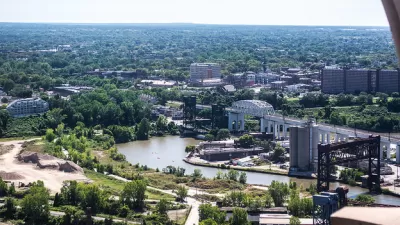Cleveland resident Anne Trubek notes a change in the city's zeitgeist. Whereas decades of disinvestment once led to cheerleading, today's mood is more proactive. A sense of civic obligation reflects an exciting but anxious time in the city's history.

"These days, the zeitgeist [in Cleveland] has changed," observes Trubek, co-editor of Rust Belt Chic: The Cleveland Anthology. "If before, you were a happy but passive contrarian, enjoying the 'lifestyle' that cost-of-living, accessibility, great culture, and tight-knit neighborhoods afforded — now there is a bit more at stake. The mood in Cleveland (speaking from my white, liberal, professional vantage) is more proactive. No longer can you just sip your wine and chat about how nice it is here. The ethos has shifted to an activist one: you have to help out, pitch in, you have to do something. There is an emergent sense of civic obligation."
"Why this shift? Why this pressure to help the city’s economic, educational, political and cultural life?" she asks. "Not because things are worse but because they are better. They are 'turning around,' 'revitalizing,' whatever term you prefer."
"But we have been here before — on the cusp of something interesting and vital — and we have seen it fail. This time, we sense that the stakes are too high, the promises too promising. This time, it cannot fail. So more people, whether individually or institutionally, are helping out those who are trying new things."
FULL STORY: Loving my City Enough to Fight For It

Planetizen Federal Action Tracker
A weekly monitor of how Trump’s orders and actions are impacting planners and planning in America.

Maui's Vacation Rental Debate Turns Ugly
Verbal attacks, misinformation campaigns and fistfights plague a high-stakes debate to convert thousands of vacation rentals into long-term housing.

San Francisco Suspends Traffic Calming Amidst Record Deaths
Citing “a challenging fiscal landscape,” the city will cease the program on the heels of 42 traffic deaths, including 24 pedestrians.

Amtrak Rolls Out New Orleans to Alabama “Mardi Gras” Train
The new service will operate morning and evening departures between Mobile and New Orleans.

The Subversive Car-Free Guide to Trump's Great American Road Trip
Car-free ways to access Chicagoland’s best tourist attractions.

San Antonio and Austin are Fusing Into one Massive Megaregion
The region spanning the two central Texas cities is growing fast, posing challenges for local infrastructure and water supplies.
Urban Design for Planners 1: Software Tools
This six-course series explores essential urban design concepts using open source software and equips planners with the tools they need to participate fully in the urban design process.
Planning for Universal Design
Learn the tools for implementing Universal Design in planning regulations.
Heyer Gruel & Associates PA
JM Goldson LLC
Custer County Colorado
City of Camden Redevelopment Agency
City of Astoria
Transportation Research & Education Center (TREC) at Portland State University
Jefferson Parish Government
Camden Redevelopment Agency
City of Claremont





























